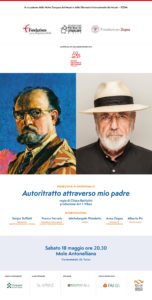To celebrate the European Night of Museums and the International Day of Museums – ICOM, the National Museum of Cinema presents the premiere of Autoritratto attraverso mio padre (Self-portrait through my father, 2019, 27’), produced by Art + Vibes and directed by Chiara Battistin. The film – showing conversations between Michelangelo Pistoletto, Alberto Fiz and Anna Zegna – was commissioned by Fondazione Cassa di Risparmio di Biella, Cittadellarte and Fondazione Zegna as part of the exhibition Padre e Figlio (Father and son), running till 13th October 2019 in Biella and Trivero. The screening, scheduled for Saturday 18th May at 20.30, is an essential document to understand the development of Michelangelo Pistoletto, whose Mirror Paintings have created a new relationship between artist and society, between the I and the others. With Cittadellarte and Casa Zegna as settings for the shooting, the Biellese artist talks about his relationship with his father Ettore Pistoletto Olivero, revealing unknown aspects of his education through a compelling narrative full of anecdotes and curiosities. Present at the event will be Sergio Toffetti, president of the National Museum of Cinema; Franco Ferraris, president of Fondazione Cassa di Risparmio di Biella; Anna Zegna, president of Fondazione Zegna; Alberto Fiz, art critic and curator of the exhibition Padre e Figlio.
“Michelangelo, an only child, was born and raised in the studio of his painter father, – we read on the press release of the event – so much so as to absorb not only the colours and the shapes, but also the flavours of an environment in which the intimately familiar and the representative dimensions are associated. After years spent learning from the father, at the beginning of the ’70s Michelangelo becomes a teacher to Ettore, who, influenced by the son, modifies his style of painting modernizing it with the insertion of mirroring elements. Michelangelo somehow leaves his inheritance to his father, overturning the traditional mechanism of succession. This creates a mutual understanding between the two in a relationship of constant presence based on an inescapable need to participate and communicate. The film also highlights the fundamental role of Ermenegildo Zegna, Ettore’s patron, who commissioned to him the ten paintings on the Art of Wool commented on by Michelangelo, who stresses their relevance and their close connection with his present cycle of production. At the beginning of the 1950s, when Ettore was painting the works for the Panoramica Zegna in Trivero, the visionary project wanted by Ermenegildo in the Biellese Alps, his driver was in fact Michelangelo, at the time drawing his first sketches.”


